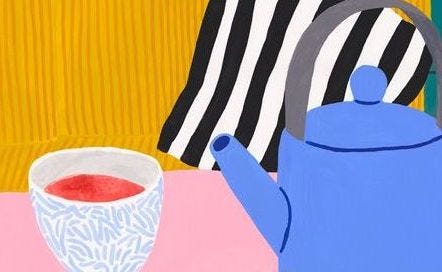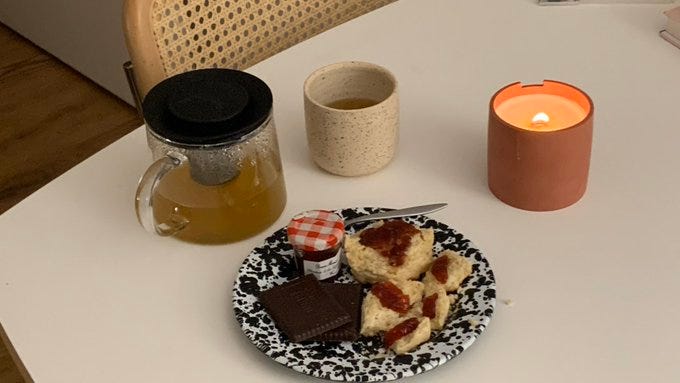Breakfast is my favorite meal of the day. Despite this, I am not very good at it. I have a habit of lying in bed until I am forced to get up, meaning I am sometimes in bed until the afternoon. Getting up to make breakfast means that the day has officially begun, that all my brain wheels have to start turning and process all the responsibilities that have been patiently waiting for me overnight. I have been working on getting up earlier — and have been doing better — but something that has helped me is the ritual of making breakfast, no matter what time it is. There’s science behind it, and we all grew up hearing that breakfast is the most important meal of the day, and I agree, but maybe for a different reason. It’s not the nutrients, or the time of day, but rather the act of gently making myself something I enjoy. I start my day off with an act of self-care, whether it’s 9 am or 2 pm. Sometimes it’s as simple as a granola bar, or a pastry I bought the day before, or a cup of tea I take on the go. Regardless, I always feel better.
This week’s poem is “Tea” by Leila Chatti. She writes:
Five times a day, I make tea. I do this because I like the warmth in my hands, like the feeling of self-directed kindness. I’m not used to it— warmth and kindness, both—so I create my own when I can. It’s easy. You just pour water into a kettle and turn the knob and listen for the scream. I do this five times a day. Sometimes, when I’m pleased, I let out a little sound. A poet noticed this and it made me feel I might one day properly be loved. Because no one is here to love me, I make tea for myself and leave the radio playing. I must remind myself I am here, and do so by noticing myself: my feet are cold inside my socks, they touch the ground, my stomach churns, my heart stutters, in my hands I hold a warmth I make.
I make normal tea when I’m feeling lazy or have a clock running, but my favorite morning ritual is making matcha. Matcha — a fine powder made of green tea leaves — has become fairly trendy over the last few years, but it originates in the Far East. Traditionally, it is a part of a Japanese Tea Ceremony, a highly ordered and often long spiritual practice with roots in Zen Buddhism. The purpose is to provide harmony of the spirit through a quiet and grounding experience. Though I don’t have the time or the tools for a fully traditional matcha experience every morning, I try and implement those same virtues in my own morning matcha. I wait for the water to boil and cool down, and use a bamboo whisk to froth my matcha back and forth. I often add frothed oat milk to make a latte. It takes five to seven minutes in total, but I am wholly immersed in the act of making it: the soft rushing of the whisk, the humming of the microwave as I heat my milk. I add honey. I drink it slowly. I let my body slide into its place. Those five to seven minutes of quiet and focus set the foundation for the rest of the day, and I try to give myself that time as often as I can. If the quiet seems intimidating, I put on The Slowdown with Ada Limòn — a podcast in which she reads a poem a day — because the episodes are always between five to seven minutes. My routine is not very consistent. Sometimes I wake up tired and annoyed and late and don’t feel focused enough to go through the steps. But there is still a slice of peacefulness in a teabag with hot water in my favorite mug. Or filter coffee, for many people. Maybe it’s not the caffeine that wakes you up, but the act of drinking it.
Leila Chatti continues:
I come from a people who pray five times a day and make tea. I admire the way they do both. How they drop to the ground wherever they are. Drop pine nuts and mint sprigs in a glass. I think to care for the self is a kind of prayer. It is a gesture of devotion toward what is not always beloved or believed. I do not always believe in myself, or love myself, I am sure there are times I am bad or gone or lying. In another’s mouth, tea often means gossip, but sometimes means truth. Despite the trope, in my experience my people do not lie for pleasure, or when they should, even when it might be a gesture of kindness. But they are kind. If you were to visit, a woman would bring you a tray of tea. At any time of day.
My family is from Iran, and I always like to joke that cardamom tea runs in my blood. Making tea has always been an important ritual in my culture (and many others). It’s a love language, in a way, knowing how someone likes their tea. Growing up, whenever a family member stopped by, it was a courtesy to invite them in for chayee, the Persian word for tea. To me, chayee isn’t only an object, but a time slot of togetherness. The time it takes for one to finish their tea also provides an opportunity to converse and catch up. No matter what you’re in the middle of — cooking, cleaning, writing emails — the visit of a dear friend or family member prompted a break, if only for the brief period of a cup of tea. It doesn’t always have to be tea either: I found great joy in being the house barista when my cousins came over, using the Nespresso with skill. I live alone now, far from my family, but I still try to reserve a piece of my day for some tea and reflection. I don’t think it’s a coincidence that I moved to a country that has such a deep association with tea. I invite people over for afternoon tea often, and we talk for hours, refilling our cups and basking in each other’s company. My association of it with love and kindness will never die.
I am young and my life is full of little bits of chaos. I have unfinished books, I forget to respond to text messages, I try to go to yoga but sometimes I just don’t feel like it. I am far from perfect, and my routine isn’t extensive or often very consistent. Normal tasks sometimes feel exhausting. But it helps to have one small thing to rely on, something that ties every day together. It’s a time I will always set aside for myself, no matter when it is.
Louise Glück wrote in Prism:
Time was experienced less as narrative than ritual. What was repeated had weight.
Further Reading
“At the Kitchen Sink” by Camille A Balla
“Mornings at Blackwater” by Mary Oliver (Read by the Author)
aubade for the whole hood by Nate Marshall
What I Enjoyed This Week
Recent Reads
Evvie Drake Starts Over by Linda Holmes. I wanted a feel-good read and this did not disappoint. It takes place in a quiet seaside town in Maine and follows a woman who tries to get her autonomy back after her husband is killed in a car accident, and a famous baseball player who’s “lost his game”. The plot is very Hallmark, but I loved how realistic it felt. There were conversations, nuanced friendships, complicated adult feelings and self-growth that wasn’t directly related to romance. It was subdued and wholesome, and nothing much really happens, but it was just what I needed. And now I want to move to Maine.
“Suggested Donation” by Heather Christle. I haven’t stopped thinking about this poem since I read it. I miss the deer in my backyard at home and also my sisters. I am trying to have rapid, intentional thoughts like this as I enjoy my breakfasts and my teas. There’s no harm in hoping until you land.
Other Wonderful Things
My shower tap was dysfunctional for five months and I finally got it fixed, so I was able to have my first proper bath in a long time. I bought a Lush bubble bar and lit some candles and read. It’s been a rainy and cold week, and it was the best thing in the world to me at that moment.
My Sensitivity is A Virtue from Okay to Rest. I love it, because it is.
Thank you for reading!
<3
Tara





this is beautiful, i always thought of drinking tea as a calming activity, but never thought of it as togetherness or having such a big effect on one's routine. thanks for sharing.
🤍